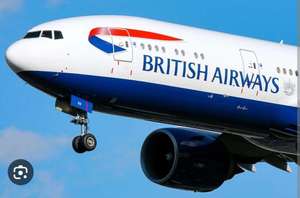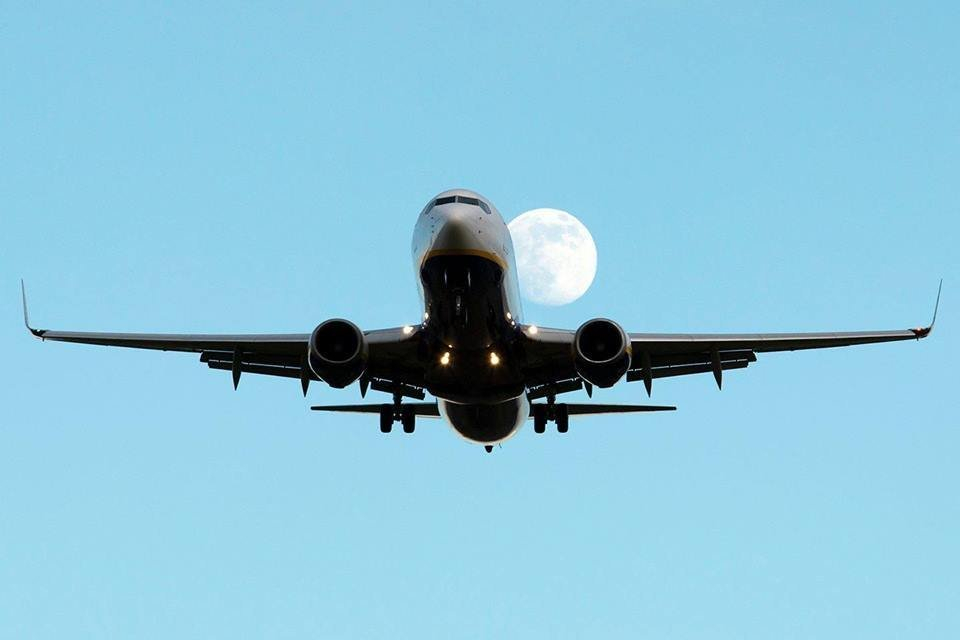

Flights Deals & Offers
100 active deals296,358 commentsAll Flights discounts and offers overview - April 2024





 hotukdeals
hotukdeals hotukdeals
hotukdeals 

























 Cheap Flights from Well-known Airlines
Cheap Flights from Well-known Airlines
Aviation has boomed in recent years, with the rise of low-cost short-haul airlines, new services from older long-haul companies, and innovations like online booking and check-in making flying cheaper and easier than ever. UK passengers are among some of the world’s best connected, with routes from major UK airports to destinations on every continent.
However, with such a wealth of choices, customers often struggle to find the best deals for their travel. This HotUKDeals buyer’s guide will help to solve that problem, and suggest other ideas to make your aviation experience as affordable and enjoyable as possible.
Passenger Aviation: A Short Story
Passenger aviation was one of the most radical inventions of the 20th century. Beginning in the 1920s, public and privately owned airlines began offering tickets on domestic, then international flights – with the UK in the vanguard.
Starting with the formation of Imperial Airways (which later became British Airways), UK companies began to bring together Europe and the wider world. Famous names like BOAC emerged, offering comfortable (if expensive) services to Africa, Asia and North America.
In the post-war era, innovation continued, with the introduction of jet engines in the 1950s cutting the journey times for routes such as London to New York, making transatlantic tourism more practical than ever before. The price of air travel continued to fall, opening up package holiday destinations on the Mediterranean Sea (and eventually destinations like the Caribbean). Supersonic passenger travel was even possible for thirty years with the development of Concorde (this has now been discontinued).
However, for everyday passengers, the key development would be more mundane: deregulation and the opening of new airports in the 1980s led to an explosion of budget airlines. Suddenly companies like Ryanair and Easyjet appeared, offering remarkably low prices. By using out of the way airports, offering no-frills on-board services and bargaining with UK airports, these companies revolutionised air travel for British customers.
The rise of the low-cost airlines coincided with the growth of the internet, resulting in beneficial consequences for air travellers. When services like Skyscanner emerged, they finally offered a way for ordinary people to search through the massive selection of flights, bypassing traditional travel agents.
Nowadays, air travel has become larger and more chaotic than ever, although it’s not hard to find great deals if you know how and where to look.
Where Can You Book Cheap Flights?
If you need to book a cheap flight to any worldwide destination, don’t just click on the most familiar link. You’ve probably got more options than you realise and you may well be missing out on the lowest prices. Here are some of the ways to book your ticket, but don´t forget to take a look at HotUKDeals first, because we deliver the cheapest option:
High street travel agents – Travel agents were once a common sight on UK high streets, but they aren’t any longer. These days, they are much rarer, but those that remain are still a useful place to visit if you are booking a trip. Specialist shops like STA Travel (who cater for younger travellers like students), Kuoni (who specialise in luxury travel experiences) and Hays (who are package holiday experts) can provide advice and will often match deals that you find online. They are also handy places to book all-inclusive holidays, with accommodation, transport and insurance all bundled together.
Airline websites – If all you need to book is a flight, airline websites are sometimes the best place to visit. British Airways, Easyjet, Virgin, FlyBe, Ryanair and Lufthansa all have search engines on their websites that allow you to consult schedules and make purchases. They may also have special portals for frequent fliers, enabling you to accumulate extra points when you book directly – something that flight aggregators don’t always include.
Flight search engines – Also known as flight aggregators, these sites are the most common port of call for online flight purchasers. Popular options include Skyscanner, Google Flights, Momondo, Expedia, Kayak and Skiplagged – all of which focus on finding the cheapest flights for your particular route. The reason they exist is to sift through the mountain of flight offers that appear online every day, and they are the first place to look whenever you need to make a booking. However, don’t take them as the final word. You may be able to negotiate a better price elsewhere. Some flights may have “hidden costs” for essentials like luggage and in-flight meals. It may also be cheaper to book all-in deals featuring hotels, car rentals and insurance elsewhere. They are a great starting point, and an excellent source of information about flight prices, but never book straight away. Always explore your options.
Online travel agents – Along with high street travel agents, you will also come across travel companies that operate exclusively online. For example Flight Centre, Opodo or Barrhead Travel allow you to book flights online. These companies differ from the flight aggregators mentioned above in that they tend to provide greater protection for customers’ bookings. When you use a service like Skyscanner, they won’t protect your booking or provide much support should your plans fall through. Travel agents offer much more peace of mind should problems arise.
Airport terminals – You can also go straight to the airport to book tickets. It may seem like something that happens only in the movies, but a surprisingly large number of business travellers like to book directly. Often, you’ll stand a better chance of being upgraded to a higher seat class, although there’s a greater risk of encountering a fully-booked plane. If you are flexible, and willing to call the airport desk regularly, it’s also a good way to find out about last minute discounts that don’t show up on major flight aggregators.
Phone bookings – Many travel agents and airlines allow you to book by phone – which can be a very handy option if you are on a bus or away from your computer for a variety of reasons. It’s not a bad option in any case, as you’ll have the chance to ask questions and talk through your options.
Kayak: Travel Problems Solved
What are the UK’s Major Passenger Airports?
Before you book your flight, it’s important to know where the major airports are in the UK, as you might be closer to a convenient take-off point than you think.
For many people in the south and south-west, London Heathrow and Gatwick are the major aviation hubs. Both offer flights across the world and are easy to access by road, train or bus.
Manchester is the nearest competitor to London’s two giants in terms of passenger numbers (although London Luton and Stansted come close as well). It’s a handy option for long-haul travellers in the north-west, Yorkshire and possibly the north-east.
If you need to fly from Scotland, both Edinburgh and Glasgow offer long-haul connections, while Aberdeen offers plenty of shorter hops to Europe. Edinburgh is also handy for travellers in the north-east of England, although Newcastle caters for many low-cost routes as well.
In the third tier of UK airports, you’ll find Liverpool, Birmingham, Bristol and Belfast – large facilities with excellent transport links and daily connections to Europe, but rarely to longer-haul destinations.
If you intend to fly to North America or the Caribbean, your choices will be much more limited, with Heathrow, Gatwick, Manchester, Edinburgh and Glasgow operating flights across the Atlantic, and Manchester and the London Airports offering connections to the Far East.
What to Look For When Booking a Flight
When you come to make a flight booking, you aren’t just booking a seat and a journey. Plenty of other variables come into play that are part of the deal and getting them wrong can ruin your travel plans. Here are some key things to consider:
Luggage allowances – Everyone travels with some form of luggage, but we all have different needs. All airlines distinguish between checked and cabin luggage. Checked luggage is stored in the hold while you can take cabin bags on with you. Both are subject to limitations, which vary by airline. However, cabin luggage will typically be below 15kg and measure around 40 x 55 x 25cm. Checked baggage is larger and heavier, at around 30kg in Economy. Allowances vary by ticket class but anyone can purchase extra space with their tickets (although this becomes costly the more you add). Some airlines also offer radically stripped-down tickets that feature a zero-baggage allowance, even on transatlantic routes. These tend to be very cheap but you’ll have to pay steep fees to add luggage, so beware.
Check-in procedures – Every air traveller needs to check-in for their flight before travelling, and the vast majority of airlines offer online check-in 24 hours before flying to make this process as streamlined as possible. Take advantage of it, as the queues for check-in can be a real time suck. You’ll probably also be able to choose your seat if you check-in online, instead of having to take whatever is available on the day of your flight.
Airport transfers – Everybody needs a way to get to and from the airports they use, and these journeys can be included as part of your booking. Given that taxis and shuttle buses can be expensive, it makes sense to explore your transfer options when you book. Low-cost airlines can look superficially cheap, but if they fly to out of the way airports with poor transport links, the costs of getting into town can mount. So make a point of exploring cut-price transfers.
Airport lounges – Almost every airport in the world has a range of lounges targeted at different classes of passenger. If you want to relax as you wait for your flight, with complimentary drinks, magazines, snacks and even spa services, you can add business or luxury lounges to your booking when you buy your ticket. If you are a member of a frequent flier scheme, be sure to check your points, as you may well qualify for a lounge upgrade even without paying extra. Don’t miss out, it’s worth it for the extra space and services.
In-flight meals – Most flights feature some form of refreshment, but the quality and cost varies depending on the airline you choose. For example, you can fly across the Atlantic with some airlines for very little, but have to pay for wine, meals and snacks. Other airlines have excellent reputations for in-flight food (including Cathay Pacific and Air New Zealand), which can be a deal breaker on long-haul flights. If you are just flying to the Mediterranean, you may want to balance the desire for a meal with lower costs – or search for deals which combine the two.
Flight duration/stop-overs – Most major airlines offer comparable flight durations for the same journey, but it’s worth checking this if you are on a tight schedule. Different plane models perform differently (although the range of jets in use is limited). More importantly, check whether your journey requires a stopover. You’ll find plenty of choices for long-haul journeys, some more attractive (and cheaper) than others.
Services for families – If you are travelling as a family, you’ll probably want to make sure that the airline you choose has the entertainment and baby-changing facilities needed to cater for your needs. You can also purchase special family tickets which drive down the cost of taking kids abroad.

Surcharges and fees – The bane of many air travellers, hidden fees are often tacked onto flight bookings, sending them soaring to rates far above the bargain they thought they were getting. Your departure and destination airports will both impose taxes on your airline, adding costs, while the airline themselves may impose surcharges for credit cards and other services. Always double check before you finalise your booking.
Travel insurance – Insurance is vital for travellers who want to have peace of mind. With the right package, your possessions, finances, health and travel arrangements will be protected, making it easier to cope should something go wrong. Most travel agents offer insurance as part of the package, but work via partner companies, and this might not be the best option. Instead, check with travel insurance comparison sites like GoCompare or Compare the Market, visit the Post Office (who offer very competitive insurance deals) or check with your bank, as your debit or credit card account may also come with travel insurance attached.
How to Get Great Flight Deals
Now, let’s quickly outline some best practices for finding the very best flight deals. These aren’t rules as such, but they are guidelines that all air travellers should bear in mind when they search for their tickets.
Think about bundling your flight, hotel, car rental, transfers and insurance together. This can save money on your holiday as a whole (but comes with a loss of flexibility, and sometimes searching for the different elements can come up with cost savings).
Use price comparison websites for any travel services you book. Make Skyscanner your first port of call and note down the cheapest flights to places you want to travel.
Don’t assume that flight aggregators offer the best prices. They may be comprehensive, but they sometimes miss short term offers. Hidden fees can also change the picture somewhat, and prices could be matched by travel agents if you confront them with the discrepancy.
Use frequent flier programs if you are a member. Not all members make best use of their Avios or frequent flier points. Many deals involve combinations of Avios and current discounts, so be sure to factor that into your search.
Use your credit card to get cheap flights. Sometimes, credit cards come with links to major airlines. Yours may offer incentives like cheap, or even free, flights. Check the fine print to see whether this applies to you.
Check codeshare buddies: Airlines often book tickets on partner company’s flights via codeshare agreements. Don’t end up paying £200 more than the person next to you. Check airlines with the same codeshare, and you may well find that there are huge differences.
Think about your luggage and in-flight needs. If you are travelling with the family or golf clubs, you’ll definitely need plenty of hold or cabin space. But if you are heading to New York for a weekend, you can save huge amounts by carrying everything in one cabin bag. It might sound tough, but you’ll be surprised by how much you can pack into a rucksack.
It’s also really important to include the time of your holiday into your planning. When you travel is almost as crucial as where you go, or what class of ticket you choose.
Booking early is usually the route to the cheapest prices. If you have concrete plans, book a few months in advance and you’ll shave 40% or more off the final ticket price.
Last minute deals are available, but can’t be relied upon. They may come up, but aren’t generally well covered by flight aggregators. Instead, you could try sites like www.lastminute.com, or call the airline/airport to see if there are any last minute discounts.
Prices also tend to be higher at different times of year. For example, the summer holidays see a major price spike due to school holidays and peak beach holiday season. Book ahead or go for shoulder seasons when flight prices are low.
Flights will also be more expensive around Christmas and the New Year, when airlines know that they have a captive market. However, there's a silver lining, as flights tend to be cheaper after Christmas. Prices often fall considerably in January, which is a good time to book a cheap city break (and a great time to check the HotUKDeals listings).
More Tips on Booking Cheap Flights
We’ve looked at the various ways to search for flights, the value of shopping around and the opportunities offered by seasonal deals and hotel, insurance, car rental and flight bundles. But let’s put that all together and actually find you the best possible deal.
Every day, people are taking off from the UK’s airports an enjoying cut-price travel to destinations they have been longing to visit. If you want to do the same, research your flight options using Skyscanner or Google, and get a picture of your options. Now, head to HotUKDeals and search out flight listings for current deals. You’ll be amazed by how many discounts are appearing on a daily basis from the UK’s leading airlines.
After that, click through to the deal and make your booking. Be sure to investigate bundle deals for accommodation and other travel essentials (and check the HotUKDeals sections for hotels and car hire to find even more discounts).
Now, you’re almost all set. All that remains is to check-in, pack, and take your seat. When you come to travel, be sure to use travel checker sites like FlightStats – which will tell you about any possible delays. If everything looks good, then have a great time!
Travel for Less by Checking Out the HotUKDeals Flights Listings
Flying is a portal to the world. With cheap flights, you can explore Africa, laze on Spanish beaches, relax in Las Vegas or shop on 5th Avenue in Manhattan. Wherever you want to travel, you’ll always find unbeatable discounts at the HotUKDeals flight listings, the best place to save money on your next holiday.




